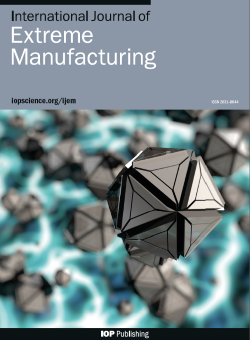Elliptical vibration chiseling: a novel process for texturing ultra-high-aspect-ratio microstructures on the metallic surface
IF 21.3
1区 工程技术
Q1 ENGINEERING, MANUFACTURING
引用次数: 0
Abstract
High-aspect-ratio metallic surface microstructures are increasingly demanded in breakthrough applications, such as high-performance heat transfer enhancement and surface plasmon devices. However, the fast and cost-effective fabrication of high-aspect-ratio microstructures on metallic surfaces remains challenging for existing techniques. This study proposes a novel cutting-based process, namely elliptical vibration chiseling (EV-chiseling), for the high-efficiency texturing of surface microstructures with an ultrahigh aspect ratio. Unlike conventional cutting, EV-chiseling superimposes a microscale elliptical vibration on a backward-moving tool. The tool chisels into the material in each vibration cycle to generate an upright chip with a high aspect ratio through material deformation. Thanks to the tool’s backward movement, the chip is left on the material surface to form a microstructure rather than falling off. Since one microstructure is generated in one vibration cycle, the process can be highly efficient using ultrafast (>1 kHz) tool vibration. A finite element analysis model is established to explore the process mechanics of EV-chiseling. Next, a mechanistic model of the microstructured surface generation is developed to describe the microstructures’ aspect ratio dependency on the process parameters. Then, surface texturing tests are performed on copper to verify the efficacy of EV-chiseling. Uniformed micro ribs with a spacing of 1~10 μm and an aspect ratio of 2~5 have been successfully textured on copper. Compared with the conventional EV-cutting that uses a forward-moving tool, EV-chiseling can improve the aspect ratio of textured microstructure by up to 40 times. The experimental results also verify the accuracy of the developed surface generation model of microstructures. Finally, the effects of elliptical trajectory, depth of cut (DoC), tool shape, and tool edge radius on the surface generation of micro ribs have been discussed.椭圆振凿:在金属表面形成超高宽比微结构的新工艺
高宽比金属表面微结构在高性能传热增强和表面等离子体器件等突破性应用中的需求日益增长。然而,对于现有技术而言,在金属表面快速、低成本地制造高宽比微结构仍具有挑战性。本研究提出了一种基于切割的新型工艺,即椭圆振动凿刻(EV-chiseling),用于高效制备具有超高纵横比的表面微结构。与传统切割工艺不同,EV-凿刻工艺是在向后移动的工具上叠加微尺度椭圆振动。在每个振动周期中,刀具凿入材料,通过材料变形产生具有高纵横比的直立切屑。由于工具向后运动,切屑留在材料表面形成微结构,而不是脱落。由于一个振动周期可产生一个微结构,因此使用超快(>1 kHz)工具振动可实现高效工艺。我们建立了一个有限元分析模型来探索电动车凿毛的工艺力学。接着,建立了微结构表面生成的力学模型,以描述微结构的高宽比与工艺参数的关系。然后,对铜进行了表面纹理测试,以验证 EV 凿刻的功效。在铜上成功制备出了间距为 1~10 μm、纵横比为 2~5 的均匀微肋。与使用前移工具的传统 EV 切割相比,EV-凿刻可将纹理微结构的纵横比提高 40 倍。实验结果还验证了所开发的微结构表面生成模型的准确性。最后,还讨论了椭圆轨迹、切削深度(DoC)、刀具形状和刀具边缘半径对微肋表面生成的影响。
本文章由计算机程序翻译,如有差异,请以英文原文为准。
求助全文
约1分钟内获得全文
求助全文
来源期刊

International Journal of Extreme Manufacturing
Engineering-Industrial and Manufacturing Engineering
CiteScore
17.70
自引率
6.10%
发文量
83
审稿时长
12 weeks
期刊介绍:
The International Journal of Extreme Manufacturing (IJEM) focuses on publishing original articles and reviews related to the science and technology of manufacturing functional devices and systems with extreme dimensions and/or extreme functionalities. The journal covers a wide range of topics, from fundamental science to cutting-edge technologies that push the boundaries of currently known theories, methods, scales, environments, and performance. Extreme manufacturing encompasses various aspects such as manufacturing with extremely high energy density, ultrahigh precision, extremely small spatial and temporal scales, extremely intensive fields, and giant systems with extreme complexity and several factors. It encompasses multiple disciplines, including machinery, materials, optics, physics, chemistry, mechanics, and mathematics. The journal is interested in theories, processes, metrology, characterization, equipment, conditions, and system integration in extreme manufacturing. Additionally, it covers materials, structures, and devices with extreme functionalities.
 求助内容:
求助内容: 应助结果提醒方式:
应助结果提醒方式:


